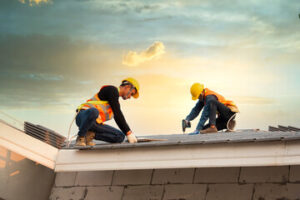Roofing is the structure that shields the home from rain, snow, sunlight, and extremes of temperature. It can be constructed in a wide variety of shapes and sizes.

Roofs may be supported by stone lintels, which can only span short distances or pre-fabricated trusses. They are often covered by plywood sheathing, and sometimes a membrane and vapor retarder. Visit https://www.northportflroofing.com to learn more.
There are many choices of roofing materials that match well with a variety of home styles. Some of the most popular include shingle, tile and concrete. Each of these has advantages and disadvantages. Tile is heavy, so if you are reroofing to replace another type of roof, you should verify that the structure can support the weight of tile.
Roof sheathing (also known as roof decking) is a vital component of the roof system and provides fundamental structural support. There are several types of sheathing, including plywood, particle board and concrete sheathing. Concrete sheathing is becoming an increasingly popular option in green, eco-friendly homes.
Wood is a traditional roofing material that pairs well with classic and historic-style homes, such as Cape Cod cottages and Craftsman homes. Wood shingles are sawmillled for uniformity and can be stained for color. However, wood doesn’t work well in damp climates and requires regular maintenance. It is also often treated with fire retardants and chemical preservatives for durability. Slate, a natural stone hewn from rock, is an attractive roofing material that can last a lifetime if properly maintained.
Installation
Your roof is the only part of your home that takes direct hits from wind, rain, hail, cold, hot, and even sunshine. It’s important to protect this investment and ensure it looks its best year after year. A good, quality roof protects your home, increases its energy efficiency, and adds to its curb appeal.
During the roofing process, a contractor will help you find the right materials for your home and install them with care. The crew sets up protective measures like tarps to cover your attic, pool, and patio/deck areas (if applicable), and covers plants to keep them safe from falling debris.
Ask potential contractors about their credentials, including certification from the manufacturer of your chosen roof material and a valid license, bonding, and proof of insurance.
Maintenance
A roof takes a lot of abuse from wind, rain, snow, hail, bitter cold, intense heat, and the sun’s rays. That’s why it’s important to invest in one that can stand up to all of it beautifully, year after year. Keeping up with roofing maintenance can help extend the life of a roof and save on energy costs, too. Replacing flashing (the material around chimneys and where roofing planes meet) can prevent leaks.
Dan is the director of the Home Improvement & Outdoor Lab at Good Housekeeping.
Repairs
As soon as you start to see roof damage, you should get up into the attic or crawlspace to take a look. The first thing you need to do is take some high-res pictures, but don’t just snap random shots – make sure there’s a sequence that makes sense and you can identify what you’re looking at. Damp areas, dark stains, cracking or peeling paint – any of these are red alerts.
Depending on the extent of the problem, you may choose to repair it or replace it entirely. Replacing your roof involves tearing off and replacing all existing shingles, which is expensive and time-consuming, but it is the most comprehensive way to deal with any problems.
Re-roofing is much cheaper, but it’s essentially just laying a second layer of shingles on top of the old ones. This means it won’t look as good and the new shingles may not match the old, so they could potentially leak as well. Plus, re-roofing can void your warranty on the new shingles. It’s a tricky choice to make.